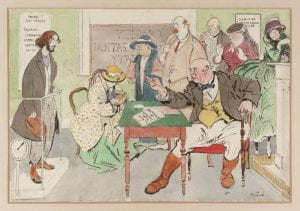
History of Social Work in Scotland
Social work across the UK developed as a response to the growing problems posed by industrialisation and urbanisation and the breakdown of traditional support systems. Today’s social work has its roots in the nineteenth century, when the majority of helping services were provided by charities and church-based groups. Poorhouses provided care to those in need but made a distinction between the deserving and undeserving poor. Relief for the poor was thought to help those in poverty but also to encourage self-sufficiency. After the second world war, the Children Act 1948 set out new support measures for children across the UK and local authorities had a duty to provide care for any child whose parents were unable to care for them. Social work in Scotland has always shared, and at the same time, been substantially different from, social work in other parts of the UK.

The 1968 Social Work (Scotland) Act is the landmark Scottish legislation which brought together social work professionals from different fields of practice within new social work departments. It consolidated legislation for children and adults in need, and probation. The Act also created Scotland’s unique Children’s Hearing System that aimed to ensure the wellbeing of children through a decision-making lay tribunal called the Children’s Panel.
Social Work Today
Scotland is divided into 32 Local Authorities and each is responsible for the delivery of social work services in its area. Social work services are provided across three broad domains: children and families, adults and criminal justice. While most services are funded by local authorities, many are delivered by non governmental or voluntary organisations (NGOs) also known as third sector organisations and the private sector (for-profit businesses).
Children and Families Social Work
Social work practice with children and families is influenced by wider social, political, and economic trends; changing attitudes toward children and families come to be reflected in legislation and policy. Legislation relating to children and families arose from a social and political climate that considers it appropriate for the state to intervene in family life. The Children (Scotland) Act 1995, the mandate for practice in Scotland, marked a change of approach, from a focus on parental authority and rights to more focus on the needs the child. It aims to strike a balance between the rights of children, the responsibilities of parents, and the duty of the state to intervene when the child’s welfare requires it – the child’s welfare is the paramount consideration. The Children and Young People (Scotland) Act 2014 enacted Scotland’s child wellbeing framework Getting it Right for Every Child. This legislation incorporated the United Nations Convention on the Rights of the Child 1989 (UNCRC) which recognises the importance of children and their rights. The principle of age and understanding is relevant in terms of giving weight to children’s views and assessing and making decisions about their capacity to understand, covered by The Age of Legal Capacity (Scotland) Act 1991. Children and families social work is also guided by the National Guidance for Child Protection in Scotland.
It is difficult to define the notion of a ‘family’. The stereotypical image of a family – a mother, father and children – is not the family form that many people will have experienced. More than half of all children in Scotland are born outside of marriage (National Records for Scotland). Children often live in diverse family forms with people they are not ‘technically’ related to but might consider family. Social workers need to know who is important to a child when trying to understand their world view. It is also important to be aware of our own views about ‘family’, as it may influence our approach.
Social work with adults
In 2016, legislation brought together health and social care in to a single, integrated system. It created 31 integration authorities who are now responsible for local services. Integration is the most significant change to health and social care in Scotland since the creation of the National Health Service (NHS) in 1948. It aims to improve care and support by putting a greater emphasis on joining up services and focussing on preventative care.
Most people want to live their lives in their own homes and within their own communities. Social work arranges for a wide range of support which helps people with particular needs to live as independently as possible. Services include advice and information, home care, day care, occupational therapy, equipment and adaptations, respite/short breaks, care homes and supported accommodation. While social workers assess the need for these services and negotiate funding, most services are provided by third sector and private organisations.
Social Workers also have a fundamental role in the protection of adults at risk of harm and abuse. The Adult Support and Protection (Scotland) Act 2007 is designed to protect adults who are unable to safeguard their own interests and are at risk of harm because they are affected by disability, mental disorder, illness, physical or mental infirmity. Harm means all harm including self-harm and neglect.
The Act requires public bodies to work together to support and protect adults who are unable to safeguard themselves, their property and their rights. The Adults with Incapacity (Scotland) Act 2000 defines Adults with Incapacity (AWI) as those who lack capacity to take some or all decisions for themselves because of a mental disorder or an inability to communicate.
Criminal Justice Social Work
The Criminal Procedure (Scotland) Act 1995 provides the main legislative framework for the criminal justice system in Scotland. Criminal Justice social workers promote and support community safety and crime prevention. Individuals are helped to tackle their offending behaviour and are assisted to live socially responsible lives. Social workers provide:
- reports to the court to assist decisions on bail and sentencing
- reports for Parole Boards to assist decisions about early release from prison
- supervision of offenders in the community
- support to offenders on employment, substance misuse, housing and financial inclusion
- supervision of offenders on Community Payback Orders who are required to perform unpaid useful work for the community
- work with prisoners and their families whilst in prison and on release
Third Sector Social Work Services
In addition to statutory social work services, social work is delivered by many third sector or non governmental organisations.
Finding Out More About Social Work in the UK
The Open University’s Open Learn service provides a free short course which introduces you to social work in the UK. You may be interested to access this here: Introducing social work: a starter kit – OpenLearn – Open University
Registration
Social Work in Scotland is regulated by the Scottish Social Services Council (SSSC). Student social workers are required to join the register and adhere to the Codes of Practice. Social work students are expected to meet the Standards in Social Work Education during their qualifying programme.
References
Smith M, Cree V (2019) Social Work in a Changing Scotland, London, Routledge